Black History, Law, Politics
 She was born in Jacksonville, Florida, but at the age of 12 her family moved to Atlanta, Ga. She received a B.A. (magna cum laude) from Wellesley College, a J.D. from Harvard Law School, and a M.P.P. in business and government policy from the Kennedy School of Government at Harvard.
She was born in Jacksonville, Florida, but at the age of 12 her family moved to Atlanta, Ga. She received a B.A. (magna cum laude) from Wellesley College, a J.D. from Harvard Law School, and a M.P.P. in business and government policy from the Kennedy School of Government at Harvard.
During the Obama Campaign for President, Patience served on the Obama/Biden Metropolitan and Urban Policy Advisory Committee and the Economy, Globalization, and Trade Policy Advisory Committee. In this role, she worked alongside others to provide local information to campaign leads. She downplays her role saying there were several people on the committee but whether there were 5 or 100 members we’re certain Patience contributed greatly.
In addition to working on policy Committees, Patience beat the
pavement locally, working on BWFO4Change phone banks and
volunteering in Virginia evenings and weekends to help elect Senator Barack Obama to the Presidency. When the campaign came to a close, she did not lose steam—she informed the campaign office that she was willing to go anywhere in Virginia to help out on Election Day. She didn’t expect them to say, “Great, we need help in Martinsville, VA.â€� It is important to note that Martinsville is 300 miles from Washington, DC and only 13 miles from the North Carolina border.
(more…)
Black History, Firsts, Politics
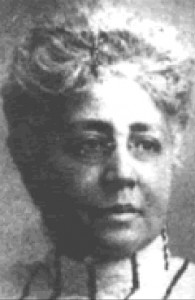
Josephine Ruffin
In 1894 Josephine St. Pierre Ruffin founded the Women’s New Era Club, a charitable organization of sixty prominent black women in Boston. Soon afterwards she began editing its monthly publication, the Women’s Era. Encouraged by the success of the New Era Club and heartened by the rapid growth of similar black women’s groups across the nation, Ruffin organized and convened the first National Conference of Colored Women at the Charles Street A. M. E. Church in Boston in 1895.
While the new organization emphasized its refusal to exclude non-black women, Ruffin nonetheless argued that African American women needed to take the leadership for their own welfare. Two years after the convention met, the National Association of Colored Women was formed with Mary Church Terrell as its first president and Ruffin as editor of the Women’s Era, now the official newspaper for the national organization.
(more…)
Black History, Law, Politics
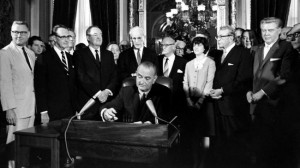
Voting Rights Act Signing
On August 6, 1965, President Lyndon B. Johnson signed the Voting Rights Act into law. Forty-seven years later, the U.S. is embroiled in a controversy over Voter ID laws that have been passed in several states, and which critics say could prevent millions of Americans from voting this year. Florida Rep. Frederica Wilson sent out a press statement today, making just that point. The statement read:
“Today, we commemorate the 47th anniversary of the Voting Rights Act, a historic milestone in the Civil Rights Movement. So many people died so that we could have the right to vote. I never thought that in my lifetime we would have to fight again for our Constitutional right to vote. (more…)
Black History, Politics
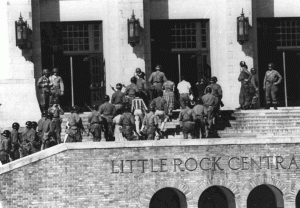
Desegregation at Little Rock: Little Rock Central High School. February 14. 1969
On October 29, 1969, the Supreme Court ruled that school districts must end segregation “now and hereafter.� With this unambiguous language, the Court, which now had Thurgood Marshall as a member, left no room for doubt or delay.Alexander v. Holmes County Board of Education is an important (and, today, curiously underrated) Supreme Court decision from 1969. It mandated immediate action in the segregation of public school facilities.
The Court was responding to a legal challenge from diehard anti-integrationists, who had learned—from civil rights proponents, no doubt—that the legal system could be used to support social objectives. The anti-integrationists, however, received a major defeat when the Court ruled unanimously that Mississippi (and, by extension, the nation) was obliged to integrate public schools “at once.â€� (more…)
Black History, Firsts, Politics
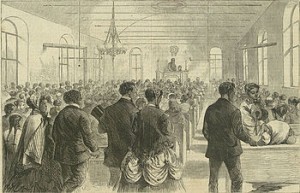
National Colored Convention in 1869v
The Colored National Labor Union arrived shortly after the development of the National Labor Union, which happened to be the first major organization founded by Andrew Cameron in 1866. The National Labor Union was dedicated with helping unions such as construction and other skilled groups and even sometimes towards farmers.
At this point in time African Americans were struggling to be noticed and taken seriously in the work field and in society they felt that if they started their own national union it would help their position in society because they were not given any help from the National Labor Union. The only thing that the National Union offered to African Americans was to encourage them to organize and separate that could be affiliated with the National Labor Union, but this plan was clearly not designed to help with racial unity because it left black workers only fighting for an entry into the union.
(more…)
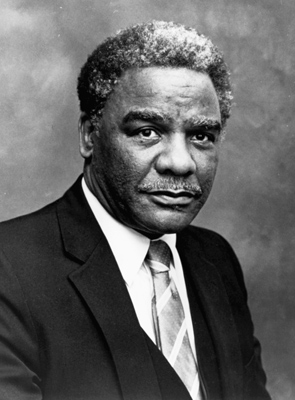
Black History, Politics
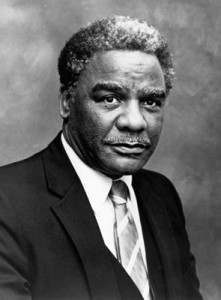
Harold Washington
b. April 15, 1922, Chicago, Ill., U.S.–d. Nov. 25, 1987, Chicago), American politician who gained national prominence as the first African-American mayor of Chicago (1983-87).
Washington graduated from Roosevelt University (B.A., 1949), earned a law degree from Northwestern University (1952), and established a private law practice in Chicago. He succeeded his father, a part-time Methodist minister, as Democratic precinct captain before working as a city attorney (1954-58) and a state labour arbitrator (1960-64). He then served in the Illinois House of Representatives (1965-76), the Illinois State Senate (1976-80), and the U.S. House of Representatives (1980-83). (more…)
 She was born in Jacksonville, Florida, but at the age of 12 her family moved to Atlanta, Ga. She received a B.A. (magna cum laude) from Wellesley College, a J.D. from Harvard Law School, and a M.P.P. in business and government policy from the Kennedy School of Government at Harvard.
She was born in Jacksonville, Florida, but at the age of 12 her family moved to Atlanta, Ga. She received a B.A. (magna cum laude) from Wellesley College, a J.D. from Harvard Law School, and a M.P.P. in business and government policy from the Kennedy School of Government at Harvard.




